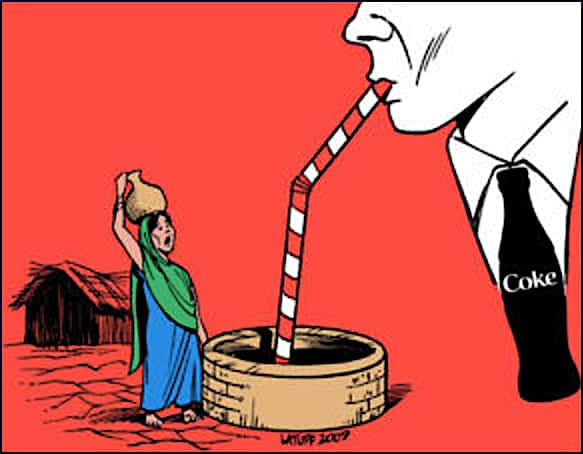
A 2013 headline announced, “Coca Cola Sponsors Brazilian Obesity Conference.” An online commentor said,
This is ugly. Coca Cola is trying desperately to become part of the “solution” to obesity. It’s like Marlboro trying to look like the solution to lung cancer. The latest ploy? Coca Cola is sponsoring a Brazilian conference on obesity and metabolic syndrome.
Another civilian assessed it like this:
The problem with Coke’s participation is that it will have a chilling effect on frank discussions of likely causes of obesity and exploration of remedial strategies. Everyone who has been in meetings knows how the tone of meetings can be manipulated by plants requesting solid proof of claims, etc., to shut down exploratory thinking that might be detrimental to vested interests.
Lots of resistance. Coke is under criticism for so many reasons. For telling parents that diet soda is better for their kids than plain water. For strangling the ocean with plastic waste. For connections with the disappearances and deaths of union leaders in South America.
For the giant, festively decorated trucks (aka “polluting monsters“) that show up in cities in the United Kingdom during the winter holidays and give away fizzy drinks. For filling 10% of Great Britain’s hospital beds with type 2 diabetes patients. For stealing India’s water, and for generally messing around with third-world governments, economies, and populations in reprehensible ways.
Speaking of Great Britain…
The sugar tax on soda went into effect this spring, meaning that a 100ml drink needs to have less than 5g of sugar or else there’s tax, and if it has more than 8g of sugar there is even more tax. Angela Dowden wrote,
However, just because a drink has escaped the fee, it would be unwise to assume it is a “healthy” choice. Many still have added flavourings, acids, colours and preservatives, while, bizarrely, some aren’t even any lower in sugar… That’s because soft drinks that take their sugar from fruit juices aren’t being taxed…
The Tesco supermarket chain alienated customers because its “meal deal,” which used to include a 500ml bottle of Coke for £3, substituted the 375ml bottle for the same price. Another problem arose when dentists insisted that some of the tax revenue should go for oral health, and not all for school sports.
A sad year
In the spring, Public Health England accused the food industry of failing to meet the government’s sugar reduction target, because among other things, sugar had been reduced in only five out of eight categories. As for the sugar levels in drinks, the Royal College of Paediatrics and Child Health said, “Of the top 20 brands, only a third showed any decrease in sugar content — and worryingly 12 per cent actually increased the amount of sugar in their products.”
In the summer, a nutrition survey of 1,000 children revealed that the 4- to 10-year-olds were eating twice the recommended daily maximum amount of sugar, and that soft drinks were still a main source of sugar for kids, comprising 10% of their intake. The venerable Cadbury company introduced a new edition of its popular Dairy Milk bar with 30% less sugar.
And get this: “It took 20 scientists, nutritionists and chocolatiers almost two years to develop the new confectionery.” Although the new version contains less actual sugar, the caloric total isn’t that different, and both kinds of bars will continue to be sold.
Meanwhile, energy drinks were doing fine in the U.K., with 70% of the country’s teenagers buying them at rates far higher than the European average, soaking up not only sugar, but massive amounts of caffeine, whose bitter flavor necessitates the addition of even more sugar to disguise it.
Fool me once, shame on you
MentalFloss.com published a list of snack foods that were originally marketed as medicines, and guess what? Four out of the 10 are fizzy drinks, including (no surprise) Coca-Cola, which used to contain the medicinal stimulant coca. From 1929 until 1948, the additive in 7-Up was the mood-stabilizing chemical lithium, while Dr. Pepper was sold as a “brain tonic and pick-me-up.”
Moxie, America’s oldest soft drink, contains gentian root, and used to be promoted as “nerve food.” (By strange coincidence, Coca-Cola just bought the Moxie company a couple of days ago.)
Other foods sold as cures were graham crackers, corn flakes, and toffee bars. Fig Newtons were advertised as aiding the digestion, as were McVitie’s Digestive Biscuits, but the name is a bit too on-the-nose.
Writer Stacy Conradt notes that the company now has to include a caveat on the label, admitting that the ingredients “do not contain any substances that assist digestion.” And as for Goo-Goo Clusters— which used to be touted as “a nourishing lunch for a nickel” — she writes,
Sure, I employ that theory on candy all of the time: peanuts are protein, chocolate has calcium, marshmallow has […] marshmallow.
PepsiCo once felt moved to make a public statement that it had been “incorrectly painted” as a soda company, when in actuality, and in all fairness, only one-fourth of PepsiCo’s revenues derive from fizzy drinks. We hope that readers will forgive any perceived snarky attitude. After all, everything can’t be the fault of soda pop, can it?
Your responses and feedback are welcome!
Source: “Coca Cola Sponsors Brazilian Obesity Conference,” DietDoctor.com, 05/31/13
Source: “Fizzy drink that avoids new sugar tax — but still has SIX teaspoons of the stuff!,” DailyMail.co.uk, 04/09/18
Source: “‘It’s shrinkflation!’,” DailyMail.co.uk, 04/08/18
Source: “Food industry fails to meet 5% sugar reduction target to tackle the UK’s childhood obesity crisis,” Independent.co.uk, 05/22/18
Source: “Children in England consuming ‘twice as much sugar as recommended’,” BBC.com, 06/15/18
Source: “Cadbury to launch Dairy Milk bar with 30 per cent less sugar,” Independent.co.uk, 07/20/18
Source: “Energy drinks consumption among UK children ‘way above’ European average,” BelfastTelegraph.co.uk, 07/10/18
Source: “10 Snack Foods Originally Sold as Medicines,” MentalFloss.com, 04/06/16
Image by KillerCoke.org

 FAQs and Media Requests:
FAQs and Media Requests: 











